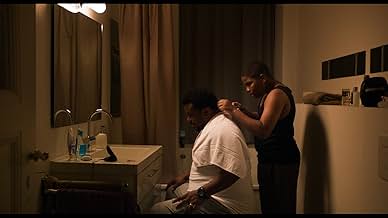IMDb-BEWERTUNG
6,3/10
5682
IHRE BEWERTUNG
Die romantischen Coming-of-Age-Missgeschicke eines 13-jährigen Amerikaners, der in Deutschland lebt.Die romantischen Coming-of-Age-Missgeschicke eines 13-jährigen Amerikaners, der in Deutschland lebt.Die romantischen Coming-of-Age-Missgeschicke eines 13-jährigen Amerikaners, der in Deutschland lebt.
- Auszeichnungen
- 3 Gewinne & 12 Nominierungen insgesamt
Florian Von Stockum
- Jakob - Soccer Trainer #2
- (as Florian von Stockum)
Handlung
WUSSTEST DU SCHON:
- WissenswertesAlthough he plays a father, Craig Robinson does not have any children but used his experiences growing up with his father as a basis for his performance. He also had to learn how to speak conversational German for his character, Curtis.
- Zitate
Curtis Gentry: Have you ever fucked bitches two at a time?
- SoundtracksCome Clean
Written by DJ Premier (as Chris E Martin), Fredro Starr (as F.Scruggs), Jeru the Damaja, Sticky Fingaz (as Kirk Jones), KRS-One (as C. Parker), Sonny Seeza (as Tyrone Taylor)
Performed by Jeru the Damaja as Jeru the Damaja
Alchemist Music, EMI APRIL MUSIC INC.
©Published by Gifted Pearl Music, Inc. inistered by Kobalt Music Publishing Limited Inernational a division of Universal Music GmbH mold, EMI Music Publishing Germany GmbH
Ausgewählte Rezension
Funny enough, but ever since my success with my review of the highly stylized and powerful street-drama Kicks, it seems that I have become the unofficial urban/hip-hop critic of the city of Toronto. Which isn't a bad thing, especially when you are reviewing some kick ass, cutting edge coming-of-age stories.
Coming-of-age stories are a dime-a-dozen in independent American cinema, let alone for films that have been accepted in the official line-up of the Sundance Film Festival. I mean, Sundance, almost being the unofficial "coming-of-age" film festival, is not only known for its dedication and glorification of youthful coming-of-age stories, but also discovering new, almost obscure talent, both behind the scenes, and in front of the camera. If you don't believe me, think of Quvenzhané Wallis from Beasts of the Southern Wild, RJ Cyler in last year's Me and Earl and the Dying Girl, Gabourey Sidibe in Precious and director Damien Chazelle to name a few. Luckily for us, Chad Hartigan's newest film, Morris From America is a very authentic tale of of an outsider of a very urban-contemporary America, growing up in the very proper and white-washed setting of Germany.
Morris From America begins with three of its most powerful characters; Markees Christmas playing the young Morris Gentry, Craig Robinson as his father, Curtis Gentry, and the powerful and overwhelming music of hip-hop. As Morris rocks his head to The Sun Rises in the East's (considered one of the quintessential hip-hop albums of all-time) track Come Clean by Jeru The Damaja, Morris complains to his father that the beat is a little slow, it lacks a hook and the song, overall, is very boring. Outraged with his son's taste in music, Curtis ground Morris for having poor taste in music. Our next shot of Mo in his room, is a tour poster of up and coming rapper from Los Angeles, Schoolboy Q, that hangs at the very centre of his room, showing Mo's love and appreciate for new age hip-hop. At this exact moment, it becomes quite clear and evident that Mo's analysis of his father's song is very much an analogy of Hartigan's newest film as well as a very clear clash of how the differences of opinions, experiences and tragedy affect two very formidable men following the tragedy of their lead female matriarch.
We never really find out what happens to Mo's mom throughout the film. Essentially, the tragedy of her absence, although quite pivotal to our main protagonists, isn't the driving point behind their actions. Sure, there's a scene where Curtis calls a European phone sex line, one of the many scenes where he finds himself stuck in an empty and cold home, lusting for attention and meaning. Robinson's longing for love is one of the many factors that make his role as Curtis one of the mot memorable of his career, especially set against that of Mo, whose friendship and crush for his only friend Katrin (Line Keller) is the driving force of Mo's motivations. Katrin, who sets course a path for Mo that not only allows him to grow up quicker than most thirteen year-olds, but also allows him to experience the stark cultural differences of growing up in a predominantly white Germany, against a childhood and adolescence in urban America.
As the very simple narrative of Morris flows through each and every scene, it seems that writer/director Hartigan is interested in one thing, and one thing only, and that's the authenticity of his star and his characters and most of all, their raw and highly relatable experiences. During the early drafts, Hartigan had a script in mind that included a white father and son, but it wasn't until Robinson and Christmas involvement that the characters were changed to a African-American father/son duo, navigating life away from the United States with a very interesting and dynamic one/two punch. Never glorifying or emotionally manipulating the trauma of Curtis' and Mo's loss; never romanticizing Katrin and Mo, and never polishing Mo and Curtis' bonds, Morris From America is your average joe character film tightened by simple and real people narrative choices.
Making his transition in Germany as painless and smooth as possible for his son and himself, Curtis enlists the help of a German student/tutor Inka (Carla Juri). Inka and Mo share some tender scenes of truth and heartache, sometimes simplifying one another's life through the simple stories surrounded by their love lives. Mo, who has taken a liking to Katrin, discovers aspects of himself he never knew he was capable of; while Inka makes some serious life choices, thanks to the stark truth and frankness of Mo's young adolescent, real world perspectives, sometimes blending in aspects of an episode of "Kids Say the Darnest Things" for good measure. Luckily for us, the film isn't without its strong female characters, allowing Inka and Mo's relationship to progress into the most maternal relationship we get from the film, yet her choices in the film play a very stark bad cop to Mo's father Curtis, who is sometimes good cop, more often then not, cool cop. Inka provides a much needed female presence in the film, that binds the family-esque flow of Morris.
Coming-of-age stories are a dime-a-dozen in independent American cinema, let alone for films that have been accepted in the official line-up of the Sundance Film Festival. I mean, Sundance, almost being the unofficial "coming-of-age" film festival, is not only known for its dedication and glorification of youthful coming-of-age stories, but also discovering new, almost obscure talent, both behind the scenes, and in front of the camera. If you don't believe me, think of Quvenzhané Wallis from Beasts of the Southern Wild, RJ Cyler in last year's Me and Earl and the Dying Girl, Gabourey Sidibe in Precious and director Damien Chazelle to name a few. Luckily for us, Chad Hartigan's newest film, Morris From America is a very authentic tale of of an outsider of a very urban-contemporary America, growing up in the very proper and white-washed setting of Germany.
Morris From America begins with three of its most powerful characters; Markees Christmas playing the young Morris Gentry, Craig Robinson as his father, Curtis Gentry, and the powerful and overwhelming music of hip-hop. As Morris rocks his head to The Sun Rises in the East's (considered one of the quintessential hip-hop albums of all-time) track Come Clean by Jeru The Damaja, Morris complains to his father that the beat is a little slow, it lacks a hook and the song, overall, is very boring. Outraged with his son's taste in music, Curtis ground Morris for having poor taste in music. Our next shot of Mo in his room, is a tour poster of up and coming rapper from Los Angeles, Schoolboy Q, that hangs at the very centre of his room, showing Mo's love and appreciate for new age hip-hop. At this exact moment, it becomes quite clear and evident that Mo's analysis of his father's song is very much an analogy of Hartigan's newest film as well as a very clear clash of how the differences of opinions, experiences and tragedy affect two very formidable men following the tragedy of their lead female matriarch.
We never really find out what happens to Mo's mom throughout the film. Essentially, the tragedy of her absence, although quite pivotal to our main protagonists, isn't the driving point behind their actions. Sure, there's a scene where Curtis calls a European phone sex line, one of the many scenes where he finds himself stuck in an empty and cold home, lusting for attention and meaning. Robinson's longing for love is one of the many factors that make his role as Curtis one of the mot memorable of his career, especially set against that of Mo, whose friendship and crush for his only friend Katrin (Line Keller) is the driving force of Mo's motivations. Katrin, who sets course a path for Mo that not only allows him to grow up quicker than most thirteen year-olds, but also allows him to experience the stark cultural differences of growing up in a predominantly white Germany, against a childhood and adolescence in urban America.
As the very simple narrative of Morris flows through each and every scene, it seems that writer/director Hartigan is interested in one thing, and one thing only, and that's the authenticity of his star and his characters and most of all, their raw and highly relatable experiences. During the early drafts, Hartigan had a script in mind that included a white father and son, but it wasn't until Robinson and Christmas involvement that the characters were changed to a African-American father/son duo, navigating life away from the United States with a very interesting and dynamic one/two punch. Never glorifying or emotionally manipulating the trauma of Curtis' and Mo's loss; never romanticizing Katrin and Mo, and never polishing Mo and Curtis' bonds, Morris From America is your average joe character film tightened by simple and real people narrative choices.
Making his transition in Germany as painless and smooth as possible for his son and himself, Curtis enlists the help of a German student/tutor Inka (Carla Juri). Inka and Mo share some tender scenes of truth and heartache, sometimes simplifying one another's life through the simple stories surrounded by their love lives. Mo, who has taken a liking to Katrin, discovers aspects of himself he never knew he was capable of; while Inka makes some serious life choices, thanks to the stark truth and frankness of Mo's young adolescent, real world perspectives, sometimes blending in aspects of an episode of "Kids Say the Darnest Things" for good measure. Luckily for us, the film isn't without its strong female characters, allowing Inka and Mo's relationship to progress into the most maternal relationship we get from the film, yet her choices in the film play a very stark bad cop to Mo's father Curtis, who is sometimes good cop, more often then not, cool cop. Inka provides a much needed female presence in the film, that binds the family-esque flow of Morris.
- lucasnochez
- 8. Feb. 2017
- Permalink
Top-Auswahl
Melde dich zum Bewerten an und greife auf die Watchlist für personalisierte Empfehlungen zu.
- How long is Morris from America?Powered by Alexa
Details
- Erscheinungsdatum
- Herkunftsländer
- Offizieller Standort
- Sprachen
- Auch bekannt als
- Morris from America
- Drehorte
- Produktionsfirmen
- Weitere beteiligte Unternehmen bei IMDbPro anzeigen
Box Office
- Bruttoertrag in den USA und Kanada
- 91.151 $
- Eröffnungswochenende in den USA und in Kanada
- 15.673 $
- 21. Aug. 2016
- Weltweiter Bruttoertrag
- 91.151 $
- Laufzeit1 Stunde 31 Minuten
- Farbe
- Seitenverhältnis
- 1.78 : 1
Zu dieser Seite beitragen
Bearbeitung vorschlagen oder fehlenden Inhalt hinzufügen






























